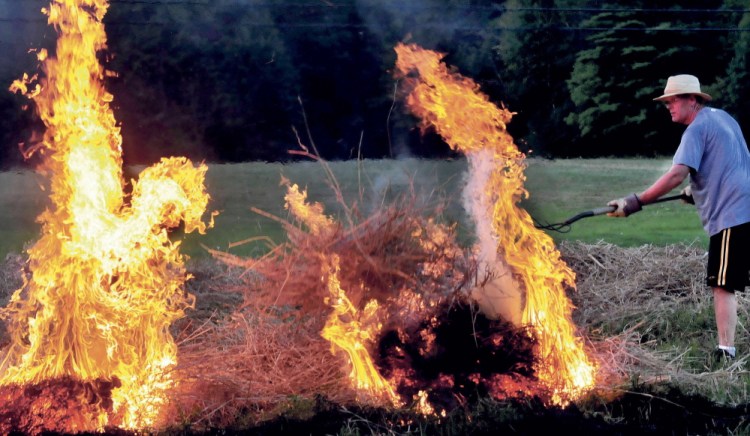AUGUSTA — A legislative committee voted Tuesday to tighten requirements for issuing online burn permits in Maine, while also reaffirming the legitimacy of third-party systems that have drawn backlash from the state agency responsible for overseeing the service.
In doing so, the Committee on Agriculture, Conservation and Forestry agreed to amendments to L.D. 1809, which include imposing a limit on the number of privately owned online systems allowed in Maine; lifting the $7 fee that the state imposes on online permits issued by the Maine Forest Service; and allowing burn permits to be viewed on a smartphone, rather than requiring the permit holder to have a paper copy.
The goal of the legislation, which now is headed for floor debate, is to clarify how third-party issuers of burn permits in Maine may operate.
Gary Hickey II, the West Gardiner fire chief and one of the developers of Warden’s Report, an online system for issuing burn permits, said Tuesday he’ll continue to track the bill’s progress as it moves forward.
Now two private systems are operating in Maine: Warden’s Report and Burning Permit, developed by Matthew Scott, of Gorham.
Last June, Hickey and Scott learned the Maine Forest Service had contacted more than 60 municipalities across Maine, warning them against using online services other than the state’s to issue burn permits. The Forest Service based its position on a review of state law by the Maine attorney general’s office, which found that while the authority to issue paper permits could be delegated to local fire chiefs and wardens, no such authority existed for issuing online burn permits.
Forest Service officials said while other systems existed, they had been allowed to develop in error, and people relying on permits issued through the private systems could be guilty of a misdemeanor.
In the final days of last year’s legislative session, lawmakers passed a bill that explicitly made the use of private systems legal.
Even so, the Department of Agriculture, Conservation and Forestry contacted dozens of communities in August with a list of requirements online services had to meet and once again cautioned against state residents using private services.
To clarify the legislation, Sen. Thomas Saviello, R-Wilton, pointed out those requirements were simply guidelines, as they were not the result of a rule-making process. He brought several changes to his bill to a committee work session on Tuesday.
The changes also include requiring the developers of online systems rather than fire wardens to submit online systems for review by the state. The bill would require the Forest Service director to approve the system within 10 days and if no action is taken, the system may be used. If the director denies the request, the decision would be appealed to state lawmakers.
The committee unanimously voted ought to pass after brief deliberation Tuesday.
During a public hearing earlier this month, fire chiefs from around the state lined up to support the private systems, testifying about the ease of use and the fact that communities that use them can provide online burn permits to residents without a fee. There is no charge for paper permits.
They said fire chiefs and fire wardens can exercise discretion over when online permits can be issued, just as they do when writing up paper permits.
The authority to issue burn permits rests with the Maine Forest Service. Anyone burning brush, wood debris, grass or agricultural fields in Maine needs a permit issued either by the Forest Service or his or her own city or town. The Forest Service imposes a number of regulations on how and when open burns may take place; the state limits them to after 5 p.m., but local fire chiefs have discretion to allow them at other times.
The Forest Service director may delegate his or her authority under state law to town forest fire wardens and their deputies for paper permits only, which the Forest Service supplies. State residents may obtain paper permits at no cost from a fire warden — often a fire chief or his or her designee — or from a Maine forest ranger.
Maine Forest Service Chief Ranger Bill Hamilton made a case for a single, centralized system and urged lawmakers at the hearing to defeat the bill, although he supported making online permits free.
On Tuesday, he provided an analysis of the number of online permits issued between April 27, 2014, and Jan. 1, 2018, to the committee.
In that time, the Maine Forest Service has issued 43,303 online permits. Of those, three have escaped the control of the people overseeing the burn.
Those using Warden’s Report were issued 48,708 online permits, and four have escaped. Those using Burning Permits have issued 33,386 online permits and two have escaped. Of the nine total escaped fires, five occurred before 5 p.m.
Jessica Lowell — 621-5632
Twitter: @JLowellKJ
Send questions/comments to the editors.






Comments are no longer available on this story